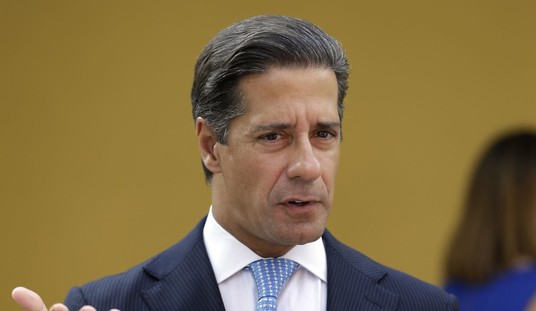“Coup-proof” is a better term since the new rules would bind both parties, of course. But only one party is poised to renominate a guy who’s already tried to overturn a federal election through chicanery.
Which is why it may be hard to find 10 Republicans in the Senate who are willing to support this entirely necessary reform.
Twice last week I wrote about the Electoral Count Act, the nineteenth-century law that governs how Congress certifies the votes of the electoral college on January 6. Surprisingly, Mitch McConnell and John Thune have hinted that the GOP would be willing to work with Democrats to fix some of the obvious flaws in that statute, most notably the ambiguous language over the vice president’s role in the proceedings. Trump will be furious if they do. That’s what makes it surprising.
But how surprising is it, really? They may fear Trump politically but they’ve come to learn the hard way that they should also fear a violent mob descending on their workplace with flex cuffs on certification day. They’d rather lose a primary than end up lynched. If they can use procedural means to extinguish any hope of Trump pressuring Congress into thwarting the electoral college, they’ll remove his incentive to incite angry supporters on January 6, 2025.
Greg Sargent says there’s a proposal to reform the ECA coming together in the Senate with three planks, all of which sound promising and common-sensical. First, the law would be clarified to say that the vice president enjoys no power to reject electoral votes or to stop the count. If that rule had been in place last year, Mike Pence might not have had a mob in the building calling for him to be hanged. Second, the bar for objecting to a state’s electoral votes would be raised. Instead of one member of the House and one member of the Senate joining forces to object, the amended ECA would require a much greater number — one-third in each body, possibly. And to actually sustain an objection and block a state’s votes from being counted, some supermajority threshold (maybe three-fifths) of each chamber would be needed. That would all but guarantee that no state’s votes could be thrown out without bipartisan support.
Third and most importantly, there’s a mechanism for addressing shenanigans at the state level. Chuck Schumer objects to reforming the ECA on grounds that if Congress is forced to accept the electors from a state, all that does is create an incentive to overturn electoral votes at the state level instead. Trump would lean on Republican legislatures and governors in states he lost to find some pretext to award their electors to him; he tried to do that in 2020 in Arizona, Michigan, and Georgia with varying degrees of energy, remember. How can Congress prevent that? Sargent:
First, [the bill] seeks to create a procedure for judicial review when a state government fails to follow its own lawful, preexisting procedures in appointing electors (in all states, this process is tied to the popular vote).
Second, the bill directs Congress to count the electors validated by the court and not the phony ones appointed by a state legislature and/or governor in that situation.
“The key point is that the state can’t change the rules after the election,” King told me. All of this reduces Congress’s role to the largely ceremonial counting of electors.
No swing state with a Republican legislature that was won by Biden in 2020 ended up certifying an alternate slate of electors but Trumpers tried to make it happen, to the point where Trump’s electors in Michigan attempted to crash the event when Biden’s winning slate formally cast its electoral votes for him on December 14, 2020. They had no legal authority to be there so they didn’t disrupt the proceedings. But it’s not unthinkable in 2024 that a GOP state legislature *would* grant them some form of legal authority, creating a controversy over which of two slates of electors was legitimate. The Senate bill would punt that question to the courts, which is probably the optimal way to handle it. Letting Congress decide would ensure that the adjudication would become a partisan sh*tshow.
Would SCOTUS uphold a law that gave it the power to decide which of two slates of electors from a state is the legitimate one? I’m guessing yes. Congress has broad constitutional power to regulate the “manner” of state elections. And the Court would doubtless recognize that it’s the closest thing America has left to an impartial institution whose ruling will be respected by (some on) both sides. Let Congress decide by majority vote which slate of electors should be recognized and you’re asking for a legitimacy crisis.
The bill that Sargent got wind of isn’t the only one kicking around Congress at the moment, by the way. Democrats must realize that their voting rights push is going nowhere and that they should be ready to move ahead on the ECA once they formally give up on it.
Just to prevent your head from spinning, there are four, apparently independent, public efforts to reform the Electoral Count Act on the Hill (& others non-public):
— Derek T. Muller (@derektmuller) January 11, 2022
A bipartisan group including Susan Collins, Mitt Romney, Joe Manchin, Kyrsten Sinema, Thom Tillis, Jeanne Shaheen, and Roger Wicker are also reportedly huddling on a proposal. That’s encouraging, as I wouldn’t have guessed Tillis and Wicker might be willing to join the gang of 10 GOPers whom Schumer needs to make this happen. Another proposal that’s being finalized in the House would adopt many of the same reforms that Sargent’s article mentions along with “Clarifying the number of Electoral College votes required to become president when objections for a state with a certain number of Electoral College votes are being adjudicated.” I assume that’s aimed at heading off this scenario imagined by John Eastman in his memo to Trump last year:

Lotta ideas in the mix here. Not a lot of time to get them done:
Romney identifying a factor working against ECA reform: “I don't think there's a urgency to get this done immediately, in part because we don't have an election where the Electoral Count Act will come into play for three years.”
— Grace Panetta (@grace_panetta) January 11, 2022
The next presidential election might be nearly three years away but a new Republican House majority in 2023 won’t lift a finger to prevent Trump from overturning the 2024 election. Any ECA reform has to happen on Democrats’ watch. Not enough Republicans care about the “utmost worry” to leave it to the GOP to address this.
I’ll leave you with this. Exit question: Will Mike Rounds also be part of the gang of 10?
. @SenatorRounds doesn’t back down, issuing a new statement: “The former president lost the 2020 election.” pic.twitter.com/iqQRXE7d1X
— Dave Catanese (@davecatanese) January 10, 2022








Join the conversation as a VIP Member